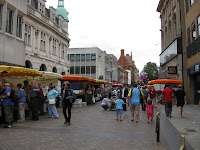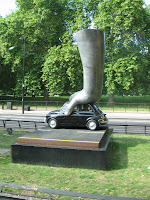
Sunday, August 7 was another busy day for us, again in Worcester at the Three Choirs Festival. Some of us took the early coach to get there in time for the morning Festival Eucharist. This beautiful service featured the combined choirs of Worcester Cathedral, together with the Corelli Orchestra, performing Franz Joseph Haydn's Missa Sancti Nicolai. It was particularly meaningful to hear this work as part of a worship service in the way that it was intended, rather than in a concert setting. The Corelli Orchestra, performing on period instruments, provided exquisite support to the performance. As a horn player, I must comment in particular on the fine natural horn playing!
By early afternoon, most of the group had arrived, and many attended a performance of Hamlet, in a production by Shakespeare's Globe on Tour. I marveled at the way in which a handful of actors covered all of the characters, changing outer garments and props in quick succession.
Some of our group dashed to the evensong service after the play, while others opted for a more leisurely dinner or a chance to explore Worcester. The evening event was a "9/11 Memorial Concert", performed by the Festival Chorus, the choristers of the three cathedrals, and the Philharmonia Orchestra. The first half included two American works -- Samuel Barber's Adagio for Strings, and John Adams' On the Transmigration of Souls -- as well as the Adagietto from Mahler's Symphony no. 5. John Adams' work combined pre-recorded sounds with the live performance, and utilized the texts of missing persons posters found in New York following the 9/11 attack, together with some quotes from "Portraits in Grief", published in the New York Times. The second half featured a fine performance of Mozart's Requiem Mass in D minor, K. 626.























